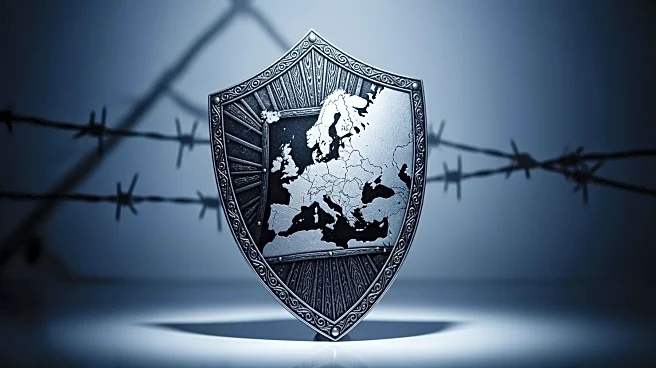What's Happening?
Estonian President Alar Karis has urged NATO allies to prepare for a 'different kind of war' with Russia, emphasizing the need for vigilance against hybrid warfare tactics. This call comes amid ongoing tensions following Russia's invasion of Ukraine in 2022,
which has led to significant loss of life and reliance on NATO support by Ukraine. Estonia, a Baltic state bordering Russia, has experienced breaches of its airspace by Russian aircraft, raising concerns about Russia's long-term intentions. President Karis highlighted the unconventional methods employed by Russia, including drone incursions and GPS jamming, as part of its strategy. Despite these provocations, Karis expressed skepticism about a direct military attack on NATO countries but stressed the importance of deterrence and preparedness.
Why It's Important?
The situation underscores the evolving nature of warfare, where traditional military confrontations are supplemented by cyber and hybrid tactics. This has significant implications for NATO's defense strategies and resource allocation. Estonia's call for increased preparedness reflects broader concerns within NATO about Russia's unpredictable actions and the need to adapt to new forms of aggression. The emphasis on hybrid warfare highlights the necessity for NATO to enhance its capabilities in cyber defense and intelligence gathering. Additionally, the ongoing conflict in Ukraine continues to strain international relations and defense budgets, prompting discussions on the adequacy of current spending commitments among NATO members.
What's Next?
NATO members may need to reassess their defense strategies and spending commitments to address the challenges posed by hybrid warfare. This could involve increased investment in cyber defense and intelligence capabilities. The alliance may also consider strengthening its presence in Eastern Europe to deter further Russian provocations. Diplomatic efforts to resolve the conflict in Ukraine remain critical, with President Trump having attempted to broker peace between Russia and Ukraine. However, skepticism about Russia's willingness to negotiate persists, potentially prolonging the conflict and necessitating continued NATO support for Ukraine.
Beyond the Headlines
The emphasis on hybrid warfare raises ethical and legal questions about the rules of engagement in modern conflicts. The use of drones and cyber tactics blurs the lines between military and civilian targets, complicating international law and accountability. This shift in warfare dynamics may also influence public perception and policy decisions regarding defense spending and international cooperation. As NATO adapts to these challenges, the alliance's ability to maintain unity and effectively respond to threats will be crucial in shaping the future security landscape.
















